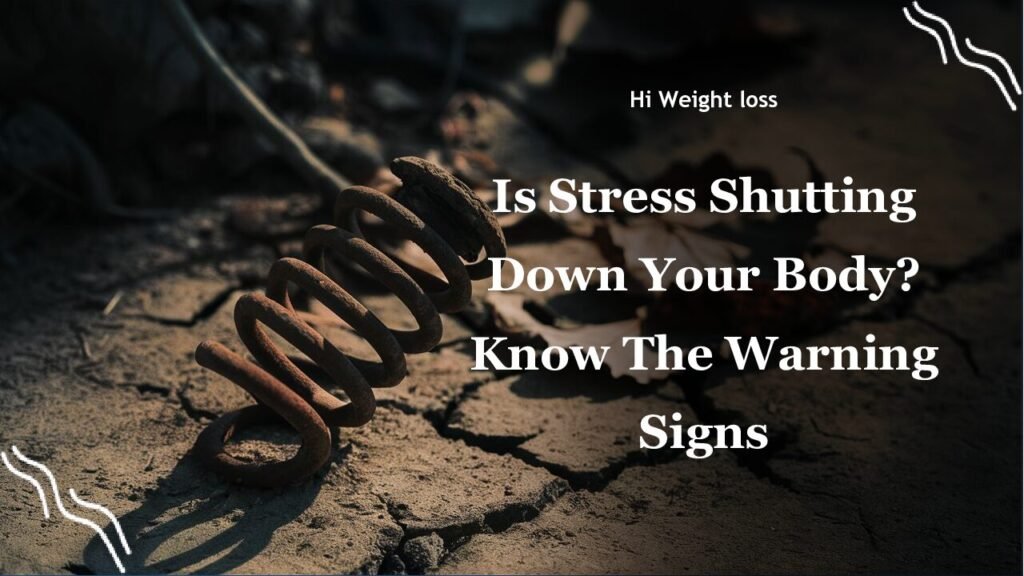“`
Ever felt like your body is just about to give up, like a computer running too many programs at once? You know, that feeling of complete exhaustion where even getting out of bed feels like climbing a mountain? Well, this might be a sign that chronic stress is taking a serious toll on you. I remember a period in my life where deadlines and personal issues piled up, and I felt constantly drained. It’s scary when you feel your body betraying you. This article will explore how chronic stress, while not causing a sudden “shutdown,” can indeed push your body to its limits, leading to serious health issues.
Can Your Body Physically Shut Down From Stress?
The Science Behind Stress and Your Body
You might be wondering, “Can *stress* actually make my body stop working?” The short answer is not in a dramatic, “lights-out” kind of way. But prolonged stress can certainly wreak havoc on your physical and mental well-being. When you experience stress, your body activates the hypothalamic-pituitary-adrenal (HPA) axis. This is your body’s built-in emergency system, releasing stress hormones like cortisol and catecholamines that prime you for “fight or flight.”
These hormones are helpful in short bursts, but when they flood your system continuously, the effects are far from ideal. Imagine these hormones as revving your engine all the time – it eventually leads to wear and tear. This constant activation of the stress response can disrupt many bodily functions, leading to serious health problems.
Physical Effects of Chronic Stress on the Body
So, what exactly happens when chronic stress becomes your constant companion? It’s like a slow leak, causing damage over time. One of the main ways stress damages your system is by affecting the cardiovascular system. Think of it like constantly running at top speed – it can lead to increased blood pressure, heart rate, and increased risk of *cardiovascular disease*.
But it doesn’t stop there. Prolonged stress can also suppress your immune system, making you more susceptible to illnesses and infections. Remember that time you were swamped with work and then got a terrible cold? That wasn’t a coincidence. In fact, some research shows that chronic stress can delay wound healing and hamper the body’s ability to fight off infections. It’s a double-whammy – your body is struggling to fight off stress and is also now more vulnerable to other health problems.
And it is important to know that the effects extend beyond the physical realm. Stress takes a heavy toll on your mental health as well. I’ve seen many friends struggle with anxiety and depression linked to ongoing stress, and I’ve experienced it myself. It’s like a heavy blanket weighing you down, making it hard to find joy. You become less resilient to the stress, meaning you’re more easily overwhelmed by even minor setbacks.

Can Stress Cause Your Body to Shut Down?
Now, let’s get back to the initial question: *Can stress cause your body to shut down*? While your body won’t suddenly collapse, the long-term effects of chronic stress can feel like a slow shutdown. Imagine your body as a machine running constantly with no maintenance. Eventually, it starts malfunctioning. This is similar to how chronic stress impacts your health. You might experience extreme fatigue, burnout, and a noticeable decline in your overall well-being. This state of exhaustion makes it hard to do daily tasks and affects your quality of life.
The truth is, chronic stress doesn’t just affect one part of your body. It’s a systemic issue, impacting your nervous system, your cardiovascular system, and your immune system. The Mayo Clinic has highlighted how “chronic stress puts your health at risk,” noting the diverse health implications. This constant activation of your stress response is not sustainable and can eventually lead to a myriad of health problems. Think about how constant alarms sound with no pause, it just becomes exhausting, and your stress responses are like those alarms going off continuously.
The Tipping Point: When Stress Becomes Dangerous
There comes a point where the accumulation of stress pushes your body to its breaking point. Have you ever heard someone say they “hit a wall”? That’s often the result of chronic stress finally taking over. I remember a friend of mine who kept pushing herself and eventually, she ended up in the hospital. Her body, in a way, forced her to slow down by getting severely sick.
When your body is continually under stress, the risk of serious health complications rises. For instance, the StatPearls highlights that the “stress reaction” causes physiological responses that can disrupt various body systems when prolonged. This constant state of alert takes a significant toll, making you vulnerable to more than just the common cold. Long term stress can cause serious illnesses. Therefore, understanding the dangers of chronic stress and knowing how it affects the body can motivate you to take action.
How to Take Control of Stress
The good news is that you’re not helpless against the effects of chronic stress. You can learn to manage and mitigate its impact on your life. The first step is to recognize the signs. Are you constantly feeling tired, anxious, or irritable? Do you have trouble sleeping? These could be warning signs that your stress levels are too high.
One helpful tip is to practice regular relaxation techniques. This could include meditation, deep breathing exercises, or even just taking a quiet walk in nature. For me, spending time in nature really helps me to clear my mind and restore my sense of peace. Small changes can make a big difference. Finding activities that bring you joy is also important. Are you a fan of reading, painting, or sports? Making time for these activities can alleviate some of your stress.
It’s also important to prioritize sleep, as this is the time your body uses to heal and recover. Try to establish a consistent sleep schedule and create a restful environment. Consider setting limits with work or activities, and learn to say no to things that might be adding to your stress. The key is to be proactive about your mental and physical health. Here is a list of suggestions you can implement now to help:
- Practice mindfulness or meditation
- Engage in regular physical activity
- Ensure adequate sleep
- Eat a balanced diet
- Set realistic goals
- Learn to say no
If you find yourself struggling, don’t hesitate to seek help from a healthcare professional. They can provide additional strategies and treatments to help you cope with the effects of chronic stress. Remember, you deserve to live a healthy and happy life, and sometimes, you need a little extra support to get there. Don’t feel ashamed to ask for it.
The Importance of Early Action
The sooner you recognize and address the effects of chronic stress, the easier it will be to prevent it from spiraling into something more serious. Early intervention can keep chronic stress from having long-lasting harmful effects on the body. Don’t dismiss symptoms such as fatigue, difficulty sleeping, or frequent illnesses, they could be signs that your body needs a break. The NICHD report on “Stress System Malfunction” highlights how critical it is to manage stress to avoid severe complications.
Think of it like caring for a garden – you can’t ignore the weeds and expect your flowers to thrive. Similarly, you need to actively manage stress to ensure your physical and mental health can flourish. By implementing some of these strategies, you are taking a proactive step to safeguard your overall health and well-being.
| Aspect | Impact of Chronic Stress |
|---|---|
| Cardiovascular System | Increased blood pressure, heart rate, risk of cardiovascular disease |
| Immune System | Suppression of immune response, increased susceptibility to infections |
| Mental Health | Increased risk of anxiety, depression, and reduced stress tolerance |
| Overall Function | Fatigue, burnout, difficulty performing daily tasks |
Conclusion
While your body doesn’t simply “shut down” like a machine when overwhelmed with stress, chronic stress can significantly impair its functions, leading to a cascade of health issues. The continuous activation of your body’s stress response can disrupt various bodily systems, such as the cardiovascular and immune systems, and can negatively impact mental health. This can lead to symptoms of fatigue, burnout, and an overall decline in your well-being. Remember my friend who ended up in the hospital? That was a wake-up call for her and a reminder that ignoring stress isn’t an option.
The key takeaway is that proactive stress management is essential. It is crucial to recognize the warning signs, adopt relaxation techniques, prioritize sleep, and seek help when needed. Don’t let stress rob you of your well-being. You have the power to take control and create a healthier, more balanced life. Take action now. Share this article with someone who you think needs it, and begin to prioritize your mental and physical well-being today!
FAQ
What are the main symptoms of chronic stress?
Common symptoms include fatigue, insomnia, increased anxiety, irritability, difficulty concentrating, and frequent illnesses.
Can chronic stress lead to long-term health problems?
Yes, prolonged stress can increase the risk of cardiovascular disease, suppress the immune system, and contribute to mental health disorders such as anxiety and depression.
What can I do to manage stress effectively?
Effective management includes regular relaxation techniques like meditation, ensuring adequate sleep, engaging in physical activity, and seeking professional help if needed.
How does stress affect wound healing?
Chronic stress can delay wound healing by suppressing the immune response and impacting the body’s ability to repair tissues effectively.
Is it normal to feel exhausted all the time from stress?
While some level of stress is normal, persistent exhaustion could indicate that your body is overloaded with stress, and you need to prioritize your well-being.
“`



